习语解释
Idioms 英语习语,谚语英汉解释
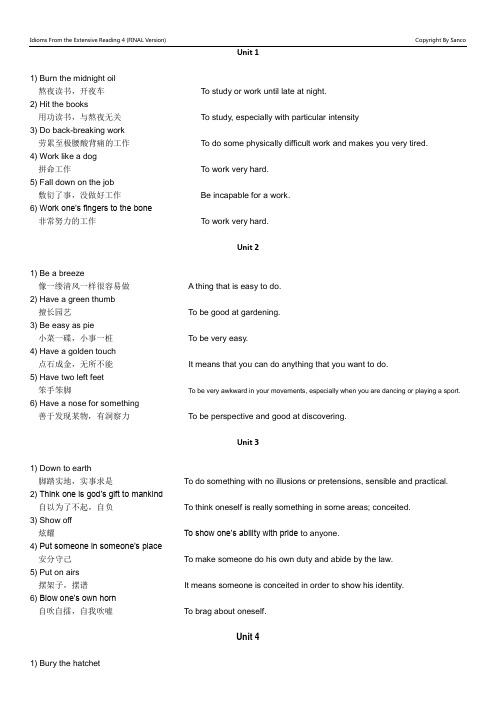
Unit 11) Burn the midnight oil熬夜读书,开夜车To study or work until late at night.2) Hit the books用功读书,与熬夜无关To study, especially with particular intensity3) Do back-breaking work劳累至极腰酸背痛的工作To do some physically difficult work and makes you very tired.4) Work like a dog拼命工作To work very hard.5) Fall down on the job敷衍了事,没做好工作Be incapable for a work.6) Work one’s fingers to the bone非常努力的工作To work very hard.Unit 21) Be a breeze像一缕清风一样很容易做 A thing that is easy to do.2) Have a green thumb擅长园艺To be good at gardening.3) Be easy as pie小菜一碟,小事一桩To be very easy.4) Have a golden touch点石成金,无所不能It means that you can do anything that you want to do.5) Have two left feet笨手笨脚To be very awkward in your movements, especially when you are dancing or playing a sport.6) Have a nose for something善于发现某物,有洞察力To be perspective and good at discovering.Unit 31) Down to earth脚踏实地,实事求是To do something with no illusions or pretensions, sensible and practical. 2) Think one is god’s gift to mankind自以为了不起,自负To think oneself is really something in some areas; conceited.3) Show off炫耀To show one’s ability with pride to anyone.4) Put someone in someone’s place安分守己To make someone do his own duty and abide by the law.5) Put on airs摆架子,摆谱It means someone is conceited in order to show his identity.6) Blow one’s own horn自吹自擂,自我吹嘘To brag about oneself.Unit 4言归于好,和解,摒弃前嫌To stop being unfriendly and become friends again.2) Button one’s lips一言不发,守口如瓶To refuse to talk and be silenced.3) Flow with the tide跟风,紧随潮流To keep following someone or the trend.4) Hold one’s tongue保持沉默,不开口To say nothing about something and stay silent.5) Let sleeping dogs lie别无事生非,招惹麻烦To avoid mentioning a subject or something that happened in the past, in order to avoid any problems or arguments.6) Mind one’s own business少管闲事,管好自己To concern oneself only with what is of interest to oneself and not interfere in the affairs of others.7) Rock the boat捣乱To do something that upsets a situation and causes problems.8) See eye to eye看法完全一致,完全同意To share the same views as somebody about something.Unit 51) Face up to something勇敢的面对To accept and deal with something that is difficult or unpleasant.2) Point one’s finger at someone指责某人To accuse somebody .3) Leave someone high and dry使某人很无助To leave someone unsupported and unable to maneuver; to leave someone helpless.4) Shoulder the responsibility能够承担责任To take responsibility.5) Pass the buck推卸责任To shirk the responsibility.6) Worm out of something推卸摆脱某事To get rid of somethingUnit 61) All or nothing孤注一掷的,没有商量余地 A situation which will end either in complete success or complete failureHaving no middle position or compromise available2) Meet someone halfway向某人妥协To compromise to somebody3) Give-and-take妥协,互让,互相迁就To have an exchange of views on some topic in order to make mutual concessions 4) Middle-of-the-road折中的办法,折中之计 A compromising solution that can be accepted by most people5) Stick to one’s guns固执己见To maintain one’s position or viewpoint when faced with opposition6) Find middle ground寻求找到一个中间立场 A set of opinions and decisions that two or more groups who oppose each other can agree on1) Go through with经历困难而完成,把事情坚持到底To do something even though it may be very unpleasant or difficult for you2) Hang in there坚持,不气馁,不畏困难To maintain a course of action despite negative outlook; to persist; to subsist while keeping high spirits 3) Give up放弃To stop trying to do something4) Stick with坚持做某事To continue or persist; to stick to5) Sweat out努力的忍耐以达到某个目的To work very hard to achieve somethingUnit 81) Be a copycat模仿别人To imitate or copy others2) Cut the apron strings摆脱依赖,独立生活To be or become impossible to manage or to control3) Be a yes-man唯唯诺诺的人To be a person who always agrees with people in authority in order to gain their approval.4) Have a mind of one’s own自有主见,能够独立思考To have one’s own idea and think independently5) Be on one’s own独立自主,不依靠他人To be independent6) Lead someone by the nose牵着别人的鼻子走,完全控制别人To have a full control of somebody7) Stand on one’s own two feet独立自主,自力更生To be independentUnit 91) Be as cool as a cucumber表示非常冷静,毫不紧张。
上山下水的解释

"上山下水"这个词汇在不同的语境中有不同的解释。
以下是两个常见的含义:
1. 农村习语:
- 在一些农村地区,人们可能使用"上山下水"来形容地理位置或住宅分布。
通常,"上山"表示住在山上,而"下水"则表示住在河流、水源旁边或下游地区。
这种表达方式主要用于描述村庄或家庭的相对位置。
2. 道德观念和修养:
- "上山下水"有时也用于形容一个人的修养和道德观念。
在这个语境下,"上山"通常表示追求高尚的品德和道德,追求卓越的人生境界;而"下水"则表示沉溺于低级趣味、低级欲望或堕落。
这种用法强调个体应该追求更高尚的人生目标,避免沉迷于低级、堕落的行为。
请注意,具体的含义可能会根据地域和语境的不同而有所变化。
在不同的文化和社会环境中,人们可能对这个词汇有着不同的理解。
习语

有趣的英语习语

大家差不多都放假回家了吧,好好为这个长假做好打算,该吃吃,该睡睡,该逛街逛街,该聊天聊天,该上网上网,当然该学英语得学英语,常来看看吧。
这些都是很常见的英语习语,希望大家每天记几个,平时说话的时候想着用上它们。
1. A cat may look at a king.[字面意思] 猫也可以看国王。
[解释] 无名小卒也可以评论大人物。
人皆可以为尧舜。
不要因为别人的资格不够老,或经验不如你多,就不让他发表意见。
2. A penny saved is a penny earned.[字面意思] 节省一个便士就等于挣了一个便士。
[解释] 省钱是明智的做法。
省一分就是赚一分。
不要因为钱的数目不大就不把它当一回事,瞧不起小钱是不对的,要记住A penny saved is a penny earned这条经验。
3. A watched pot never boils.[字面意思] 眼睛盯着看的壶永远不会开。
[解释] 事情在进行中,不到时候就不会有结果,要水到渠成才行。
心急锅不开。
你着急?着急也没用!用眼睛盯着它看也无济于事,事情不会因为你着急就会有较快的进展。
4. A word to the wise.[字面意思] 送给智者的一句话。
[解释] 给明智而愿意接受别人意见或建议的人提出忠告。
我知道你能听进去话,所以我才跟你这么说。
我说的是正确的,对你有好处,而且我知道你也会听取我的意见。
5. All is well that ends well.[字面意思] 结尾好就意味着一切都好。
[解释] 结局好,一切都好。
出自莎士比亚剧本名。
在开始或中间环节出现的一些小的差错或麻烦无关紧要,没什么大不了的,只要最终的结局令人满意,那就是好的。
6. Bad news travels fast.[字面意思] 坏消息传得快。
[解释] 好事不出门,坏事传千里。
7. Beauty is only skin deep.[字面意思] 美貌只是肤浅的。
习语中英文解释
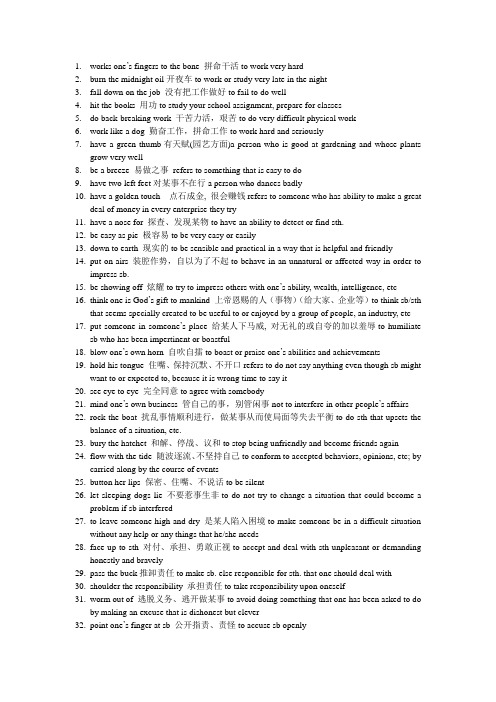
1.works one’s fingers to the bone 拼命干活to work very hard2.burn the midnight oil开夜车to work or study very late in the night3.fall down on the job 没有把工作做好to fail to do well4.hit the books 用功to study your school assignment, prepare for classes5.do back-breaking work 干苦力活,艰苦to do very difficult physical work6.work like a dog 勤奋工作,拼命工作to work hard and seriously7.have a green thumb有天赋(园艺方面)a person who is good at gardening and whose plantsgrow very well8.be a breeze 易做之事refers to something that is easy to do9.have two left feet对某事不在行a person who dances badly10.have a golden touch 点石成金, 很会赚钱refers to someone who has ability to make a greatdeal of money in every enterprise they try11.have a nose for 探查、发现某物to have an ability to detect or find sth.12.be easy as pie 极容易to be very easy or easily13.down to earth 现实的to be sensible and practical in a way that is helpful and friendly14.put on airs 装腔作势,自以为了不起to behave in an unnatural or affected way in order toimpress sb.15.be showing off 炫耀to try to impress others with one’s ability, wealth, intelligence, etc16.think one is God’s gift to mankind 上帝恩赐的人(事物)(给大家、企业等)to think sb/sththat seems specially created to be useful to or enjoyed by a group of people, an industry, etc 17.put someone in someone’s place 给某人下马威, 对无礼的或自夸的加以羞辱to humiliatesb who has been impertinent or boastful18.blow one’s own horn 自吹自擂to boast or praise one’s abilities and achievements19.hold his tongue 住嘴、保持沉默、不开口refers to do not say anything even though sb mightwant to or expected to, because it is wrong time to say it20.see eye to eye 完全同意to agree with somebody21.mind one’s own business 管自己的事,别管闲事not to interfere in other people’s affairs22.rock the boat 扰乱事情顺利进行,做某事从而使局面等失去平衡to do sth that upsets thebalance of a situation, etc.23.bury the hatchet 和解、停战、议和to stop being unfriendly and become friends again24.flow with the tide 随波逐流、不坚持自己to conform to accepted behaviors, opinions, etc; bycarried along by the course of events25.button her lips 保密、住嘴、不说话to be silent26.let sleeping dogs lie 不要惹事生非to do not try to change a situation that could become aproblem if sb interfered27.to leave someone high and dry 是某人陷入困境to make someone be in a difficult situationwithout any help or any things that he/she needs28.face up to sth 对付、承担、勇敢正视to accept and deal with sth unpleasant or demandinghonestly and bravely29.pass the buck推卸责任to make sb. else responsible for sth. that one should deal with30.shoulder the responsibility 承担责任to take responsibility upon oneself31.worm out of 逃脱义务、逃开做某事to avoid doing something that one has been asked to doby making an excuse that is dishonest but clever32.point one’s finger at sb 公开指责、责怪to accuse sb openly33.find middle ground 找到折中的办法to find things which do not belong to either of twogroups, ideas, or plans but have elements of each, often in a less extreme form.34.all or nothing指行动过程需竭尽全力of a course of action requiring all one’s efforts35.meet people halfway 妥协、迁就、迎合某人to make a compromise with sb.36.stick to one’s guns 坚持自己的观点和立场to refuse to change one’s mind about something,even though other people are trying to persuade him/her that he/she is wrong37.middle-of-the-road 中间路线、中立政策(of people, policies, etc) moderate38.give-and-take 互相迁就、交换意见、扯平利益与损失to help other people and do things forthem as well as expecting them to do things for you39.give up 放弃、停止、辞去to abandon an attempt to do sth40.go through with 完成(工作、计划)、实现、贯彻(诺言等)to do sth you had promisedor planned to do, even though it causes problems or you are no longer sure you want to do it 41.hang in there 坚持下去to keep trying to do sth and not give up even though it might bedifficult42.sweat …out 在不愉快的条件下坚持、焦急或紧张地等待某事发生to waituncomfortably for sth to happen or end43.stick with 坚持做某事to continue doing something the way you did or planned to do before44.be on one’s own 独自居住to be alone45.be a copycat 一味模仿他人的人to be a person who always imitate others46.lead sb by the nose 完全控制某人、使某人完全听命于自己to make sb do everythingone wishes, control sb completely47.cut the apron strings 脱离(母亲、妻子等)影响与控制to get rid of the control of (usu. themother) over an adult child48.be a yes-man 唯唯诺诺的人someone who always agrees with and obeys their employer,leader etc in order to gain some advantage49.have a mind of one’s own 性格果断;自有主张to be capable of forming opinions,making decisions, etc independently50.stand on one’s own two feet 自立、不依靠他人be independent and able to take care ofoneself51.be as tough as nails 非常严肃、从容to be very tough and not easily frightened or notcaring about the effects of your actions on other people52.go to pieces (人)(精神、身体)崩溃、失去自制力(of a person) have a breakdown; losecontrol of oneself53.keep one’s chin up 勇敢、坚决、不气馁、保持乐观to remain cheerful in difficultcircumstances54.hold one’s head up 昂首挺胸、不再垂头丧气to behave proudly; maintain one's dignity55.be cool as a cucumber (在困难情况下)从容不迫、泰然自若to be very calm andcontrolled, esp. in difficult circumstances56.fall apart 散开、失败、垮台、关系破裂to break; fall to pieces; disintegrate57.pull oneself together 恢复镇静、控制自己to force oneself to stop behaving in a nervousfrightened or uncontrolled way58.reach the boiling point 极度兴奋to be very emotive59.blow up 夸大某事、吹捧某人to exaggerate or inflate sth60.grit one’s teeth 咬紧牙关to bite one’s teeth together, esp. when one is in pain, angry, or underpressure61.hold one’s temper 耐住性子;不使脾气发作to succeed in controlling one’s anger62.be hotheaded 性格急躁、易冲动be rash; impulsive63.count to ten 从一数到十(一边有时间镇定自己或控制情绪)to deal with someone’semotions in order to try to stay in calm; to calm down64.icy stare 冷漠的凝视very cold and unfriendly stare65.give someone the cold shoulder 故意冷漠某人to deliberately ignore someone or beunfriendly to them, esp. because they have upset or offended you66.be cool toward someone 冷漠地to be not showing enthusiasm, friendliness toward someone67.welcome someone with open arms 热情地欢迎某人welcome with great affection andenthusiasm68.turn one’s nose up … at 蔑视to refuse to accept sth. /sb. because you don’t think it is /theyare good enough for you69.turn one’s back on someone对某人或组织置之不理;拒绝予以帮助to avoid or reject sb/sth70.be a loner 不合群者to be a person who avoids the company of others71.two heads are better than one 两人智慧胜一人two people working together achievemore than one person working alone72.brainstorm 突然精神错乱、灵机一动、心血来潮moment of confusion or forgetfulness;sudden mental aberration73.go it alone 单独行动、单干to attempt to carry out a task or start a difficult project withouthelp from others74.put heads together 交流思想、交换意见to discuss a difficult problem together75.join forces 与…合作come together in order to achieve a common aim76.pool one’s resources 共同向基金提供资源to combine your money, ideas, skills etc withthose of other people so that you can all use them77.lend … a hand 帮助to give sb help with sth78.be hard-hearted 无同情心、无情、冷酷be lacking in feeling or sympathy, unkind79.go to bat for 为别人抱不平,为别人出头to support or help someone80.have a heart 心地好的to be sympathetic or kind; show mercy81.have a heart of gold 心地善良、慷慨大方used to refer to a person who has a very kindcharacter82.have a heart of stone 铁石心肠、冷酷to have a pitiless and unfeeling nature83.be tight fisted 小气的、吝啬的to be not generous with money84.be warm-hearted 热情的、亲切的to be kind and sympathetic85.be on cloud nine 极其快乐to be very happy about sth.86.be down in the dumps沮丧、垂头丧气to be very sad and without much interest in life87.be in seventh heaven 极乐;欢天喜地to be in state of great happiness88.be out of sorts 脾气坏的;身体不适的to be in bad temper; be feeling unwell89.be tickled pink 高兴的要命to be very pleased or amused90.feel blue 忧郁、情绪低落to feel sad and depressed91.walk on air 得意洋洋、兴高采烈to feel extremely happy about sth92.be on top of the world 非常愉快自豪(尤指获得成功或好运)to be very happy or proud, esp.because of success or good fortune93.be right on target 正好达到目标to be right to make good progress and are likely to achievethe result that is wanted94.beat around the bush 旁敲侧击, 拐弯抹角地说to talk about sth without coming to themain point95.miss the mark 未达到原定目标not to achieve sth. you were trying to do96.be off base 错误to be completely wrong97.get to the heart of 了解了最重要的事to better understand the most important thing aboutwords and their stories98.hit the nail on the head 一针见血、猜中to express the truth precisely, guess correctly99.be an old hand at 有某种技巧或经验, 老手Used to describe someone who has done aparticular job or activity for a long time and who can do it very well100.know …like the back of one’s hand 对…了如指掌to be thoroughly familiar with a place, subject, etc101.know the ropes 熟悉…内情;很在行to know the all the things someone needs to know to do a job or deal with a system102.be not born yesterday 并非无知;又不是三岁小孩be not foolish or likely to be deceived because of lack of experience103.be … green 未成熟的;无经验的to be young and lacking experience; naive104.live-and-learn 活到老学到老;不经一事; 不长一智knowledge has no limit.; knowledge is infinite.; learning is an endless process.; never too old to learn105.be two-faced 伪君子;两面的;有二心的to be deceitful or insincere106.tell it like it is 说实话;如实反映情况to tell the truth107.talk behind someone’s back 在别人背后说坏话to talk without sb’s knowledge or consent 108.bare one’s soul 说心里话to reveal one’s most secret feelings109.look someone in the eye 勇敢地面对,大胆滴正视(某人、危险、对手等)to look directly at someone when speak to them, esp. to show that you are not afraid of them, or that you’re telling the truthy one’s cards on the table 摊牌;把意图公开111.to be honest and open about one’s resources and intensions112.eyes are bigger than one’s stomach 眼馋肚子饱used to describe someone is too greedy in asking for or taking more food than he can eat113.lose one’s head 失去控制、惊慌失措to become unable to behave calmly or sensibly 114.bite off more than someone could chew 自不量力,做力所不能及的事情to attempt to do too much or sth that is too demanding115.eat like a horse 贪婪地吃、狼吞虎咽eat a lot116.burn oneself out 精疲力竭to work so hard over a period of time that one becomes unable to continue working because one is tired, ill or unable to think of any new idea117.spread oneself too thin 企图同时做很多事情而分散精力;贪多嚼部烂to try to do too many things at same time so that one can not do any of them effectively118.take it easy 放松;从容自在to relax, not work too hard or do much。
习语等解释性翻译

中英习语解释性翻译或形象具体互译一、以《浮生六记》为例1.一灯如豆…The light of a rapeseed oil lamp was then burning as small as a pea.2. 但李诗宛如姑射仙子,有一种落花流水之趣,令人可爱。
…but Li Po’s poems have the wayward charm of a nymph. His lines come naturally like dropping petals and flowing waters, and are so much lovelier for their spontaneity.3. 兼之玉碎香埋,不堪回首矣。
… and the woman I loved is dead, like broken jade and buried incense. How sad indeed to look back upon these things.4. 芸初缄默,喜听余议论。
余调其言,如蟋蟀之用纤草,渐能发议。
Yun was at first very quiet and loved to hear me talk, but I gradually taught her the art of conversation as one leads a cricket with a blade of grass. She then learned the art of conversation.5.……有女名憨园。
亭亭玉立,真一泓秋水照人寒。
She had a girl by the name of Hanyuan, who was a very sweet young maiden, still in her teens. Her eyes looked“like an autumn lake that cooled one by its cold splendor”.【2】二、Double-way: literal translation; borrowing; paraphrase1.过街老鼠(直译)like a rat crossing the street(意译) the object of universal condemnation; a bad man hated by everybody2.门庭若市(直译) the courtyard is like a market.(意译)a much visited house; a busy town; bustling; crowded3.望梅止渴(直译)to gaze at plums to quench one’s thirst(意译)to console oneself with false hopes; to feed on fancies (illusion); imagined satisfaction; a Barmecide (《一千零一夜》中一个口惠而实不至的人物)feast.4.危如累卵(直译)as dangerous as a pile of eggs(意译)hazardous in the extreme; great insecurity; in a precarious condition; at stake, at risk; at hazard; in peril; in danger; perilous; risky; critical...5.山雨欲来风满楼(直译)The wind sweeping through the tower heralds a rising storm in the mountains.(意译)A turbulent situation foretells a big event; Coming events cast their shadows before.6.树倒猢狲散(直译)When the tree falls, the monkeys scatter.(意译)Members run away when the family (constitution) falls; when an influential person fallsfrom power, his hangers-on disperse; Rats leave a sinking ship.7. 三个臭皮匠顶得上诸葛亮(直译)Three cobbers with their wits combined equal ZhuGeliang the master mind.(意译) eamwork; Brainstorming; Many hands make light work.; Two heads are better than one. (拙译) wits combined are wits of great mind; Wits combined are wits that satisfy;8. 螳螂捕蝉,黄雀在后(直译)The mantis stalks the cicada but behind them lurks the oriole (金莺;黄莺儿).(意译) Be careful about the hidden/implicit\potential risks; hazards;9. 比上不足,比下有余(直译)worse off than some, better off than many; to fall short of the best, but be better than the worst; better off than the worst and worse off than the best;(意译)fairly well-off; fairly contented life;10. 不以物喜,不以己悲(直译)not pleased by external gains, not saddened by personal losses;(意译)take one’s personal gains lightly; to be philosophical about; be open-minded;11. 金无足赤,人无完人(直译) Gold can't be pure and man can't be perfect;(意译)Human beings are human beings三、形象—具体1. 哭得泪人似的A.The child was in floods of tears.B.Be drenched in tearsC.He became a wretch of tearsD.While Mother was feeling so wrought, the slightest cross word or ill-judgedremark could reduce her to tears.当母亲感到过分劳累紧张时,哪怕是听到一点点令人生气的话或不妥之词,都会使她伤心得落下泪来。
”背靠背”是一个习语吗?如果是,它的意思是什么?
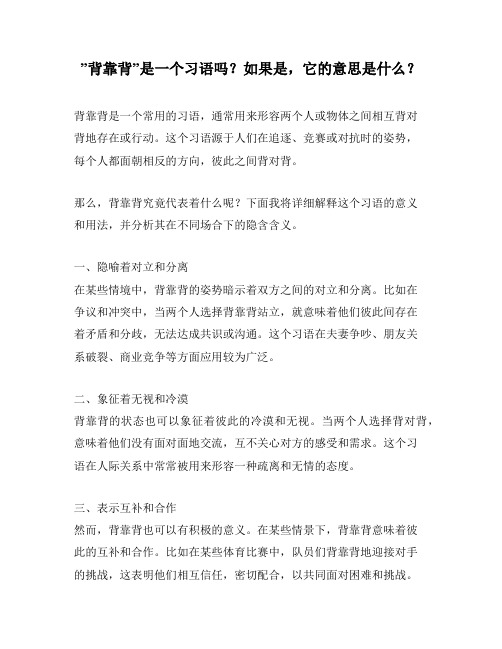
”背靠背”是一个习语吗?如果是,它的意思是什么?背靠背是一个常用的习语,通常用来形容两个人或物体之间相互背对背地存在或行动。
这个习语源于人们在追逐、竞赛或对抗时的姿势,每个人都面朝相反的方向,彼此之间背对背。
那么,背靠背究竟代表着什么呢?下面我将详细解释这个习语的意义和用法,并分析其在不同场合下的隐含含义。
一、隐喻着对立和分离在某些情境中,背靠背的姿势暗示着双方之间的对立和分离。
比如在争议和冲突中,当两个人选择背靠背站立,就意味着他们彼此间存在着矛盾和分歧,无法达成共识或沟通。
这个习语在夫妻争吵、朋友关系破裂、商业竞争等方面应用较为广泛。
二、象征着无视和冷漠背靠背的状态也可以象征着彼此的冷漠和无视。
当两个人选择背对背,意味着他们没有面对面地交流,互不关心对方的感受和需求。
这个习语在人际关系中常常被用来形容一种疏离和无情的态度。
三、表示互补和合作然而,背靠背也可以有积极的意义。
在某些情景下,背靠背意味着彼此的互补和合作。
比如在某些体育比赛中,队员们背靠背地迎接对手的挑战,这表明他们相互信任,密切配合,以共同面对困难和挑战。
综上所述,背靠背是一个常见的习语,它在日常生活中用来形容对立和分离,冷漠和无视,以及互补和合作。
根据不同的语境,我们可以理解和应用这个习语,用以表达对于人际关系和团队合作的不同态度。
无论是负面的还是积极的含义,背靠背都是一个有力的隐喻,能够让人们共同思考和反思彼此间的关系和沟通方式。
只有通过理解和尊重对方的需求和立场,我们才能够建立更加和谐和有效的人际关系。
形容细节的成语有哪些 形容从细节抓起的成语

形容细节的成语有哪些形容从细节抓起的成语形容细节的成语有哪些1、精益求精2、成语释义:指细致部析。
3、成语释义:细致详尽的剖析。
4、习语释义:丝丝:每丝;皮带扣:织布机主要部件编织时,每一根丝线都必须穿过钢筘。
比喻做得非常细致,有条不紊,彼此合拍。
5、成语释义:修饰琢磨文章的细节。
6、成语释义:时:时宜,时机。
行动不失时机。
指不做不切合时宜的事。
7、习语释义:精致:精致细致,指人的灵活敏捷。
这里指的是明亮宽敞的窗户。
后来用来形容为人圆滑,待人接物无微不至。
8、不差毫发9、抽丝剥茧10、成语释义:秋毫:秋天鸟兽新生的绒毛。
鸟兽在秋天新长的细毛的尖端。
比喻极微小的东西或极细微的地方。
11、成语释义:毫.发:都是古代的长度名,十毫为发,十发为厘,形容细微。
形容一点儿也不差。
12、成语释义:非常小心地进行,谨言慎行。
13、精耕细作14、八面玲珑15.成语释义:呫:分开;理:皮肤的质地。
比喻分析的很详细。
16、不遗巨细17、无微不至18、戴目倾耳19、成语释义:指农业上认真细致地耕作。
20、谨慎小心21、成语释义:戴目:仰视的样子,指望着远处。
形容期待.盼望的样子。
22、睹微知著23、堤溃蚁孔24、倾耳戴目25、成语释义:微:细小。
精心细致地描摹,连极小之处也不大意。
形容认真细致,一丝不苟。
26、剥茧抽丝27、儿女英雄28、成语释义:比喻说理严密。
29、毫分缕析30、敬小慎微31、明察秋毫32、滴水不漏33、成语释义:丝得一根一根地抽,茧得一层一层地剥。
形容分析事物极为细致,而且一步一步很有层次。
34、利析秋毫35、成语释义:比喻极微小的东西或极细微的地方。
同“秋毫之末”。
36、成语释义:精心细致地雕刻。
形容创作艺术品时的苦心刻画。
也比喻认真细致地加工。
37、习语释义:海一样的广阔,天一样的无垠。
描述大自然的浩瀚。
比喻散漫,没有中心。
形容从细节抓起的成语1、刻画入微2、丝丝入扣3、条解支劈4、习语释义:精:完美,好;好处:多。
idioms英语名词词汇学解释
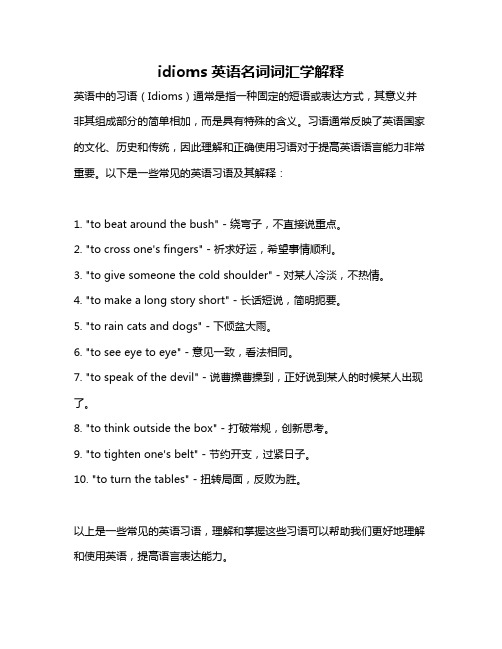
idioms英语名词词汇学解释
英语中的习语(Idioms)通常是指一种固定的短语或表达方式,其意义并非其组成部分的简单相加,而是具有特殊的含义。
习语通常反映了英语国家的文化、历史和传统,因此理解和正确使用习语对于提高英语语言能力非常重要。
以下是一些常见的英语习语及其解释:
1. "to beat around the bush" - 绕弯子,不直接说重点。
2. "to cross one's fingers" - 祈求好运,希望事情顺利。
3. "to give someone the cold shoulder" - 对某人冷淡,不热情。
4. "to make a long story short" - 长话短说,简明扼要。
5. "to rain cats and dogs" - 下倾盆大雨。
6. "to see eye to eye" - 意见一致,看法相同。
7. "to speak of the devil" - 说曹操曹操到,正好说到某人的时候某人出现了。
8. "to think outside the box" - 打破常规,创新思考。
9. "to tighten one's belt" - 节约开支,过紧日子。
10. "to turn the tables" - 扭转局面,反败为胜。
以上是一些常见的英语习语,理解和掌握这些习语可以帮助我们更好地理解和使用英语,提高语言表达能力。
四字成语解释带出处50个
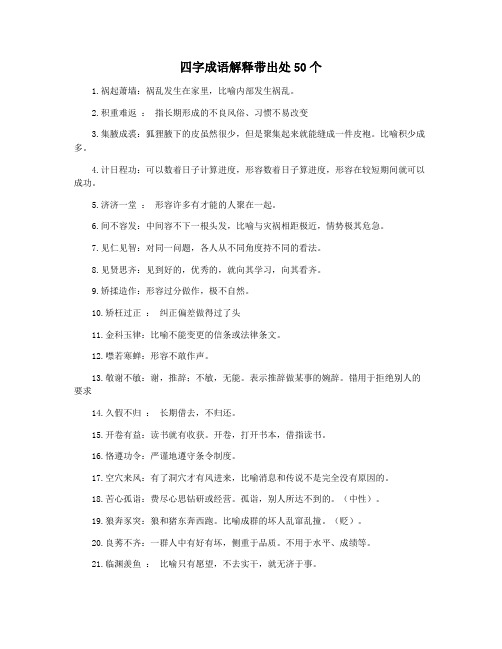
四字成语解释带出处50个1.祸起萧墙:祸乱发生在家里,比喻内部发生祸乱。
2.积重难返:指长期形成的不良风俗、习惯不易改变3.集腋成裘:狐狸腋下的皮虽然很少,但是聚集起来就能缝成一件皮袍。
比喻积少成多。
4.计日程功:可以数着日子计算进度,形容数着日子算进度,形容在较短期间就可以成功。
5.济济一堂:形容许多有才能的人聚在一起。
6.间不容发:中间容不下一根头发,比喻与灾祸相距极近,情势极其危急。
7.见仁见智:对同一问题,各人从不同角度持不同的看法。
8.见贤思齐:见到好的,优秀的,就向其学习,向其看齐。
9.矫揉造作:形容过分做作,极不自然。
10.矫枉过正:纠正偏差做得过了头11.金科玉律:比喻不能变更的信条或法律条文。
12.噤若寒蝉:形容不敢作声。
13.敬谢不敏:谢,推辞;不敏,无能。
表示推辞做某事的婉辞。
错用于拒绝别人的要求14.久假不归:长期借去,不归还。
15.开卷有益:读书就有收获。
开卷,打开书本,借指读书。
16.恪遵功令:严谨地遵守条令制度。
17.空穴来风:有了洞穴才有风进来,比喻消息和传说不是完全没有原因的。
18.苦心孤诣:费尽心思钻研或经营。
孤诣,别人所达不到的。
(中性)。
19.狼奔豕突:狼和猪东奔西跑。
比喻成群的坏人乱窜乱撞。
(贬)。
20.良莠不齐:一群人中有好有坏,侧重于品质。
不用于水平、成绩等。
21.临渊羡鱼:比喻只有愿望,不去实干,就无济于事。
22.令人发指:发指,头发竖起来,形容非常愤怒。
23.另眼相看:用另一种眼光看待,多指看待某个人(或某种人)不同于一般。
24.门可罗雀:大门前面可以张网捕雀,形容宾客稀少,十分冷落。
25.门庭若市:形容交际来往的人很多。
26.面目全非:事物的样子变得很厉害,贬义.指变得很糟。
27.目无全牛:用来形容技艺已达十分纯熟的地步。
(褒义词)28.沐猴而冠:沐猴戴帽子,装成人的样子。
比喻装扮得像个人物,而实际并不像。
29.暮鼓晨钟:比喻可以使人警觉醒悟的话。
idiom名词解释

idiom是一个英语单词,意思是“惯用语”或“习语”。
它指的是一种固定的短语或表达方式,其中包含着特定的含义和用法。
在语言学中,idiom被视为一种语言单位,它通常由多个单词组成,并且具有自己独特的语法和语义特征。
这种表达方式通常是由语言社区中的成员长期使用而形成的,因此它的意义和用法往往与单个单词的意义和用法不同。
例如,“in the black”是一个英语idiom,意思是“盈利”或“有结余”。
它是由“black”这个单词构成的,但是它的意义和用法与“black”这个单词的意义和用法不同。
在普通的语境中,“black”通常表示“黑色”,但是在“in the black”这个idiom中,它的意义已经被引申到了“盈利”或“有结余”。
此外,idiom还可以分为不同的类型,例如成语(phrase idioms)、俚语(slang idioms)和谚语(proverbs)。
成语是由两个或更多的单词组成的固定短语,通常具有特殊的含义和用法;俚语是一种非正式的语言表达方式,通常用于亲密的谈话或社交场合;谚语是一种具有普遍真理和智慧的简短表达方式,通常以一个简洁而富有启示性的句子呈现。
总之,idiom是一种特殊的语言单位,它是由语言社区中的成员长期使用而形成的固定短语或表达方式。
它具有自己独特的语法和语义特征,并且通常不能简单地通过单个单词的意义来解释。
英语习语的理解与翻译

英语习语的理解与翻译•在语言的发展过程中,人们进过长期的社会实践提炼出一些固定的短语或短句,这就是习语(idiom),也是语言的精华,是人们智慧的结晶。
这里所涉及的习语从广义上讲,包括俗语colloquialism),谚语proverb,俚语(slang expression)等。
•特点:习语大多短小精悍、言简意赅、生动形象、通俗易懂,是广大人民所喜闻乐见的一种形象化的语言,不仅具有浓郁的民族和地方色彩,还集中体现了语言中的各种修辞手法。
•通常采用的四种翻译方法:直译法、直译加注法、套译法和意译法。
•一、直译法•直译法就是在不违背汉语语言规范的前提下,尽可能地将英语习语的民族特点和地方色彩忠实地、形象地体现出来。
采用直译的习语多半是英语和汉语在习语的比喻和形象方面基本相同的部分,或者直译后语言一目了然,不至于产生误解的。
•To add flowers on the brocade•To add fuel to the fuel•To be mindful of personal gains and losses•To be on thin ice•To be wild with joy•Beyond cure•To blow one’s own horn•To call white black• A castle in the air•As easy as turning over one’s hand•To fish in troubled waters•To give up halfway•To go all out•To go through fire and water•Heart and soul•In broad daylight•To kill two birds with one stone•Misfortunes never come slightly.•To play the lute to a cow•Smooth tongue• A stony heart•Strike while the iron is hot.•To turn a blind eye to•To turn a deaf ear to•Walls have ears.•二、直译加注法•有些习语还含有比喻意义、象征意义或是历史典故等,在翻译的时候一般要在其后加注进行解释。
常见的美国习语
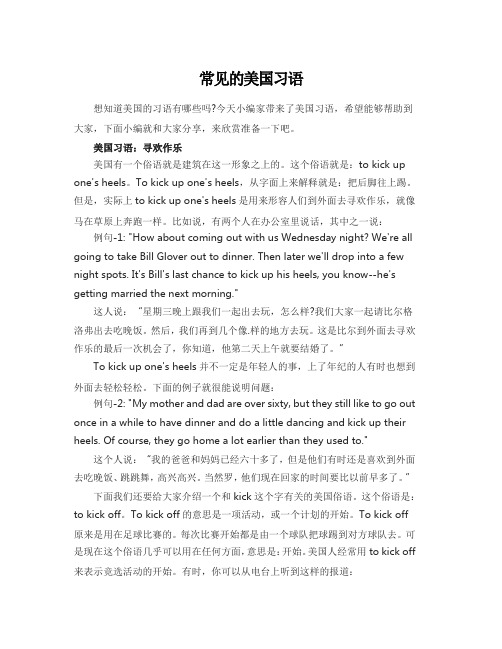
常见的美国习语想知道美国的习语有哪些吗?今天小编家带来了美国习语,希望能够帮助到大家,下面小编就和大家分享,来欣赏准备一下吧。
美国习语:寻欢作乐美国有一个俗语就是建筑在这一形象之上的。
这个俗语就是:to kick up one's heels。
To kick up one's heels,从字面上来解释就是:把后脚往上踢。
但是,实际上to kick up one's heels是用来形容人们到外面去寻欢作乐,就像马在草原上奔跑一样。
比如说,有两个人在办公室里说话,其中之一说:例句-1: "How about coming out with us Wednesday night? We're all going to take Bill Glover out to dinner. Then later we'll drop into a few night spots. It's Bill's last chance to kick up his heels, you know--he's getting married the next morning."这人说:“星期三晚上跟我们一起出去玩,怎么样?我们大家一起请比尔格洛弗出去吃晚饭。
然后,我们再到几个像.样的地方去玩。
这是比尔到外面去寻欢作乐的最后一次机会了,你知道,他第二天上午就要结婚了。
”To kick up one's heels并不一定是年轻人的事,上了年纪的人有时也想到外面去轻松轻松。
下面的例子就很能说明问题:例句-2: "My mother and dad are over sixty, but they still like to go out once in a while to have dinner and do a little dancing and kick up their heels. Of course, they go home a lot earlier than they used to."这个人说:“我的爸爸和妈妈已经六十多了,但是他们有时还是喜欢到外面去吃晚饭、跳跳舞,高兴高兴。
英语习语与西方文化

英语习语与西方文化英语习语是英语中常用的短语和词组,它们在日常交流和写作中经常被使用。
这些习语在英语中有特殊的含义,经常与具体的文化背景相关。
了解和了解这些英语习语可以帮助我们更好地理解西方文化。
本文将介绍一些常见的英语习语,并解释它们的意义和背后的文化背景。
1. "break the ice"(打破僵局)这个习语意味着打破冷场或尴尬的局面,开始友好的交流。
在西方文化中,人们经常使用这个习语来描述他们开始谈话或交朋友的过程。
这个习语源自冰冻的水面上覆盖着一层薄冰,如果有人去“打破”这一冰层,水面下的缓慢流动就会恢复。
2. "butterflies in my stomach"(肚子里有蝴蝶)这个习语意味着紧张或兴奋的感觉。
在西方文化中,人们常常在面对重要场合或感情上的时刻感到“肚子里有蝴蝶”。
这个习语来源于人们的肚子里感觉像有一窝蝴蝶在飞舞的感觉。
4. "cost an arm and a leg"(代价很高)这个习语意味着某事非常昂贵或代价高昂。
这个习语源于这样一个概念,以为失去一只胳膊或一条腿会给人带来无可估量的痛苦和困难。
5. "the ball is in your court"(球在你的场上)这个习语意味着现在轮到你采取行动或做出决定。
在西方文化中,这个习语通常用于交流中,表示一个人需要采取行动或做出决策。
这个习语来源于网球比赛中的一个概念,其中球在你的一端,意味着现在轮到你击球。
6. "spill the beans"(泄漏秘密)这个习语意味着不小心或故意泄露秘密,让事情为大家所知。
在西方文化中,人们经常使用这个习语来形容一个人意外或故意泄露一个秘密。
这个习语的起源并不确切,可能与古代公开市场倾销实践有关。
8. "the early bird catches the worm"(早起的鸟儿有虫吃)这个习语意味着早起的人会有更多的机会。
中文习语的应用和理解

中文习语的应用和理解中文习语在我们日常的交流中扮演着重要的角色,它们丰富了我们的语言表达,也反映了中华文化的深度和智慧。
本文将重点探讨中文习语的应用和理解。
一、习语的定义和特点习语是由一组词或短语组成的固定搭配,具有特殊的意义,表达方式不按字面意思解释。
习语具有以下几个特点:语义固定、使用频率高、易产生联想、韵味十足。
二、习语的应用领域中文习语广泛应用于各个领域,包括日常生活、文学作品、电影电视剧等。
在日常生活中,人们常常使用习语来增强语言的表达能力和幽默感。
在文学作品中,习语可以给作品增添情趣和文化内涵。
在电影电视剧中,习语的运用可以使对话更加生动有趣,增加观众的共鸣和情感交流。
三、习语的分类和举例根据习语的来源和用途,可以将习语分为成语、俗语、谚语和歇后语等。
以下是一些常见的习语及其对应的意思:1. 成语:成语是中文习语中最常见的一种形式,它们源于文化传统和历史典故,具有鲜明的中国特色。
例如:“一见钟情”表示对某人产生强烈的好感;“画龙点睛”表示在作品中增加亮点;“卧薪尝胆”表示通过艰苦的努力来实现目标。
2. 俗语:俗语是习语中具有民间色彩的一种形式,它们通俗易懂,言简意赅。
例如:“一言既出,驷马难追”表示一旦说出的话很难收回;“守株待兔”表示坐等机会而不主动去争取。
3. 谚语:谚语是习语中常用于教导和警示的形式,用语简练,寓意深远。
例如:“吃一堑,长一智”表示从失败或困境中获得教训;“宁拆十座庙,不毁一桩婚”表示不愿意牺牲自己的利益或者和亲朋好友关系破裂。
4. 歇后语:歇后语是一种常用于幽默表达的习语形式,由两个部分组成,前一部分是对某种情境或者事件的描述,后一部分是出人意料的回答。
例如:“相煎何急”形容不必为小事争吵;“狐假虎威”形容弱者借助强者的势力来欺压别人。
四、习语的理解和运用技巧对于中文习语,理解和运用是同样重要的。
要正确理解和运用习语,需要注意以下几点:1. 掌握语境:习语的意义通常是依赖于特定的语境和情景的,因此在运用习语时需要确保语境的准确。
语言的文化传承名词解释
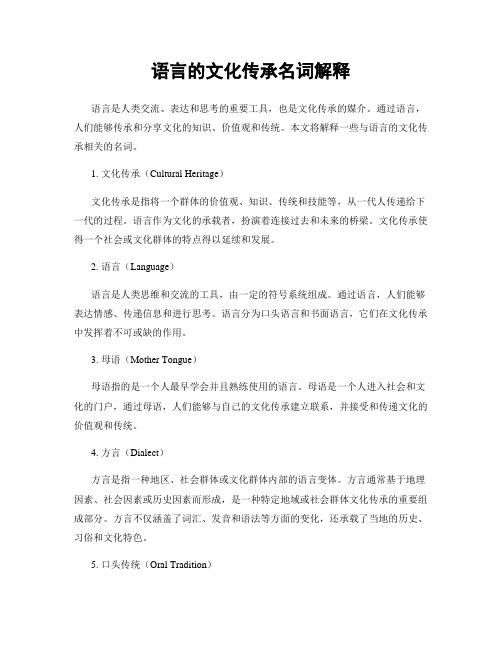
语言的文化传承名词解释语言是人类交流、表达和思考的重要工具,也是文化传承的媒介。
通过语言,人们能够传承和分享文化的知识、价值观和传统。
本文将解释一些与语言的文化传承相关的名词。
1. 文化传承(Cultural Heritage)文化传承是指将一个群体的价值观、知识、传统和技能等,从一代人传递给下一代的过程。
语言作为文化的承载者,扮演着连接过去和未来的桥梁。
文化传承使得一个社会或文化群体的特点得以延续和发展。
2. 语言(Language)语言是人类思维和交流的工具,由一定的符号系统组成。
通过语言,人们能够表达情感、传递信息和进行思考。
语言分为口头语言和书面语言,它们在文化传承中发挥着不可或缺的作用。
3. 母语(Mother Tongue)母语指的是一个人最早学会并且熟练使用的语言。
母语是一个人进入社会和文化的门户,通过母语,人们能够与自己的文化传承建立联系,并接受和传递文化的价值观和传统。
4. 方言(Dialect)方言是指一种地区、社会群体或文化群体内部的语言变体。
方言通常基于地理因素、社会因素或历史因素而形成,是一种特定地域或社会群体文化传承的重要组成部分。
方言不仅涵盖了词汇、发音和语法等方面的变化,还承载了当地的历史、习俗和文化特色。
5. 口头传统(Oral Tradition)口头传统是一种通过口头交流的方式将知识、历史和文化传递给后代的方式。
许多文化群体在没有书面语言的情况下,通过口头传统来传承文化。
口头传统包括故事、谚语、歌曲和民间传说等,这些传统通过口述的方式代代相传,同时也体现了当地的语言和文化特点。
6. 词汇(Vocabulary)词汇是语言中的单位,用于表示特定概念、物体或动作。
词汇不仅携带着语言的语义信息,还反映了当地文化的价值观和传统。
不同语言的词汇中可能存在着文化差异,比如某个文化群体可能对某个概念拥有更多的词汇来进行描述,这反映了他们对这个概念的重视程度和文化特点。
7. 习语(Idiom)习语是一个语言中具有特定含义的短语,其意义通常不能从单个词语的字面意思推断出来。
事字的解释新华字典

事字的解释新华字典
《新华字典》是一本权威的现代汉语字典,下面是对“事”字
的解释:
1. 名词解释:
a. 事情、事务,指具体的事件、活动或工作。
b. 事情的经过或结果,指某件事情的发展过程或最终成果。
c. 事变、事件,指重大的社会、政治或历史上的事件。
2. 动词解释:
a. 做,从事,表示从事某种活动、工作或行为。
b. 处理,办理,表示对某件事情进行处理或办理。
3. 形容词解释:
a. 实际的,真实的,表示与实际情况相符,不虚假。
b. 可行的,合适的,表示某种做法或方法可行或适合。
4. 习语解释:
a. 事事如意,表示每件事情都如意顺利。
b. 事半功倍,表示付出的努力与所获得的成果不成比例,意味着效率高。
c. 无事生非,表示无事生出纷争或麻烦。
以上是《新华字典》对于“事”字的解释。
一字开头的成语及解释

一字开头的成语及解释篇一:一字开头的成语以一个词开头的习语一、一枝一栖:比喻找到一份职业或栖身之所2.一点知识:你不全面,理解不透彻。
3、一板一眼:比喻言语、行动有条理或合规矩。
有时也比喻做事死板,不懂得灵活掌握。
4.核销:核销。
画一支笔,把它全部擦掉。
比喻是轻率地否定所有的成就和优势。
5、一斑窥豹:从竹管的小孔里看豹,只看到豹身上的一块斑纹。
比喻只看到事物的一部分,指所见不全面或略有所得。
6.公正:掌握并主持;致:极点,大多数。
一切都是出于公众利益。
描述无私。
7、一肢半节:比喻事物的一小部分。
8.曲折:原指写作的曲折。
现在这篇隐喻文章的结构是起伏的。
这也意味着事情的发展过程中有许多意想不到的变化。
9、一本正经:原指一部合乎道德规范的经典。
后用以形容态度庄重严肃,郑重其事。
有时含讽刺意味。
10.像水一样的失败:它描述了军队的巨大失败,就像泼在地上的水一样无法控制。
11、一病不起:得病后病情一天天恶化,终至死亡。
12.先抽一鞭:第二个念头争夺第一个念头。
也指第一个。
13、一瓣心香:心香:旧时称中心虔诚,就能感通佛道,同焚香一样。
比喻十分真诚的心意(用在祝愿)。
14.一笔抹杀:指不计后果地否定一切成就和优势。
15、一草一木:比喻极微小的东西。
16.死手:保守和不愿改变的隐喻。
17、一以当百:一人抵过百人。
极言勇猛。
18.栖息在树枝上:鸟停在树上。
通常指工作岗位。
19、一臂之力:臂:胳膊。
指一部分力量或不大的力量。
表示从旁帮一点忙。
20.死信:写在纸上的未兑现或无法兑现的东西。
21、一本万利:本钱小,利润大。
22.一长两短:指意外的灾难或事故。
23、一叶障目:眼睛被一片树叶挡住,指看不到事物的全貌。
24.一个分支和一个栖息地:指找到一份工作或一个居住的地方。
25、一知半见:谓不成熟的一点见解。
26.一望无际的绿色:它描述了无边的绿色。
27、一表人才:表:指外貌。
形容人容貌俊秀端正。
28.完全故障:描述失控的故障。
- 1、下载文档前请自行甄别文档内容的完整性,平台不提供额外的编辑、内容补充、找答案等附加服务。
- 2、"仅部分预览"的文档,不可在线预览部分如存在完整性等问题,可反馈申请退款(可完整预览的文档不适用该条件!)。
- 3、如文档侵犯您的权益,请联系客服反馈,我们会尽快为您处理(人工客服工作时间:9:00-18:30)。
Put up with:If you put up with something, you tolerate or accept it, even though you find it unpleasant or unsatisfactory. (Syn: tolerate, endure)
Turn out:结果/露面(for sth.)
Carry on: ~doing sth. 继续干某事carry on some activity,进行一项活动一段时间Someone is carrying on某人做某事,令人相当不爽,而且还在继续
E.g. She was yelling and screaming and carrying on.
Someone is carrying on with sb. else 某人与另一个人之间有你不认同的性关系。
A straw in the wind (BrE) (预示发生某事的)迹象,苗头,征兆
like a fish out of water
Fig. appearing to be completely out of place; in a very awkward manner.
Bob stood there in his rented tuxedo, looking like a fish out of water.
Whenever I am with your friends, I feel like a fish out of water. What on earth do you see in them—or me?
in a world of one's own
Fig. aloof; detached; selfcentered. (*Typically: be ~; get [into] ~; live ~.)
John lives in a world of his own. He has very few friends.
Mary walks around in a world of her own, but she's very intelligent.
in kind
1. in goods rather than in money.
The country doctor was usually paid in kind. He accepted two pigs as payment for an operation.
Do you have to pay tax on payments made in kind?
2. similarly; [giving] something similar to what was received.
John punched Bill, and Bill gave it back in kind.
She spoke rudely to me, so I spoke to her in kind.
on the air
broadcasting (a radio or television program).
The radio station came back on the air shortly after the storm.
We were on the air for two hours.
at length
1. after some time; finally.
At length, the roses bloomed, and the tomatoes ripened.
And at length, the wizard spoke.
2. and at some length for quite a long time.
He spoke to us about the problem at some length.
He described the history of his village at length.
with flying colors
[Cliché] easily and excellently.
John passed his geometry test with f lying colors.
Sally qualified for the race with f lying colors.
won't hold water
to be inadequate, insubstantial, or illconceived.
Sorry, your ideas won't hold water. Nice try, though.
The prosecution's case wouldn't hold water, so the defendant was released.
slip one's mind
[for something that was to be remembered] to be forgotten.
I meant to go to the grocery store on the way home, but it slipped my mind.
My birthday slipped my mind. I guess I wanted to forget it.
go to pot and go to the dogs
Fig. to go to ruin; to deteriorate.
My whole life seems to be going to pot.
My lawn is going to pot. I had better weed it.
wear and tear (on something)
Fig. the process of wearing down or breaking down something by regular use.
Driving in freezing weather means lots of wear and tear on your car.
I drive carefully and have my car serviced regularly to avoid wear and tear.
high and dry
Fig. safe; unbothered by difficulties; unscathed. (As if someone or something were safe from a flood. See also leave so high and dry.)
While the riot was going on down on the streets, I was high and dry in my apartment.
Liz came out of the argument high and dry.
touch-and-go
very uncertain or critical.
Things were touch-and-go at the office until a new manager was hired.
Jane had a serious operation, and everything was touch-and-go for two days after her surgery.
in black and white
Fig. [of an agreement, contract, or statement] official, in writing or printing. (*Typically: be ~; get something ~.)
I have it in black and white that I'm entitled to three weeks of vacation each year.
Take it or leave it.
Inf. Take this one or none; you have no choice.
Bill: That's my final offer. Take it or leave it. Bob: Aw, come on! Take off a few bucks.
Bill: Aw, I want eggs for breakfast, Mom. Mother: There's only cornf lakes left. Take it or leave it.。
